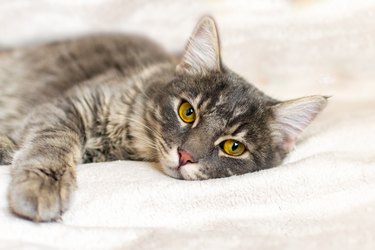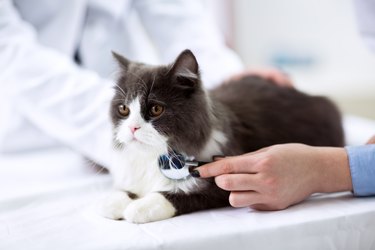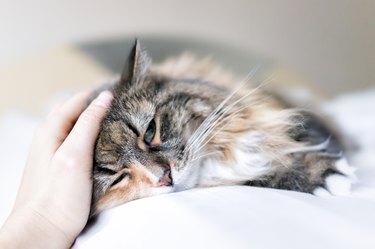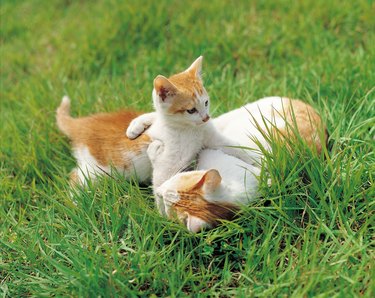Cats can suffer from bacterial and viral infections or allergies that cause congestion in the sinuses. This can lead to pain and discomfort for cats because they cannot simply blow their nose. To give your cat some relief, they may need an antihistamine that helps with congestion. It's good to note that antihistamines and decongestants are not the same thing. However, antihistamines can help with congestion by drying up a runny nose when the nasal discharge is clear and watery.

Video of the Day
Can I give my cat a decongestant?
No, you should not give your cat any medications that are classified as decongestants. However, there are products such as antihistamines and saline solutions that you can give for nasal congestion, sneezing, and nasal discharge. There are a few different options from which to choose, with certain cats responding better to some than others. Many are even available over the counter, but your veterinarian will instruct you on how to use them.
Video of the Day
Although allergies are a common cause for sneezing and congestion in humans, the most common cause for these symptoms in cats is a viral infection, like feline herpesvirus or calicivirus. So, if your cat does not improve with over-the-counter medications, take them to a veterinarian right away. Do not give your cat antihistamines if they have nasal discharge that is yellow or green. Doing so can cause the thick discharge to become even more thick (like glue), which is harder to expel.
You should also seek immediate veterinary care if your cat has a decreased appetite. Even a few days of not eating well can cause a serious condition called hepatic lipidosis. Decreased appetite and not drinking enough water will also lead to your cat becoming dehydrated and becoming more ill. If at any point your cat develops a wheeze or signs of a secondary bacterial infection (green or yellow nasal discharge), they need to be examined right away. Wheezing can be a sign of asthma or bronchitis.

Natural decongestants for a cat's stuffy nose
Saline spray will help to naturally open up the nose and sinuses and can be used in conjunction with other medicines, such as Chlor-Trimeton or Benadryl. Nasal spray is often very effective in treating congestion in cats, and most cats will not fight the nasal spray as hard as they will fight a tablet going down their throat.
Steam or moist air can help to relieve congestion naturally. You can provide steam to your cat in a couple of different ways. The most convenient method is to plug in a vaporizer, humidifier, or nebulizer and ensure that they are breathing in that moist air.
If you don't have a vaporizer or nebulizer, you can bring the cat in the bathroom with you while you take a hot shower. You can enjoy a relaxing shower, and the cat will benefit from the steam in the room. Allow your cat to sit in the steam-filled room for at least 15 minutes per session and do this two times per day.
Over-the-counter decongestants for cats
Do not use products labeled as decongestants or extended release on cats. Though people may view antihistamines as being decongestants, they aren't classified as decongestants, though they have the mild "side effect" of drying up nasal secretions. Antihistamines are sold in a variety of ways, such as a single active ingredient product, or they can be found in combination with a decongestant.
Chlor-Trimeton for cat allergies
Chlor-Trimeton, also known as chlorpheniramine maleate, is an over-the-counter antihistamine tablet that is sold for human consumption but can sometimes be used safely in cats. This medication is primarily used for allergic reactions in cats, including congestion, runny nose, and skin conditions.
Prior to giving any medication to your cat, check with the veterinarian for a recommended dosage based on your cat's size, age, and condition. Note that using this medication for cats is considered an off-label use of this drug and the directions for humans won't apply to your cat. After taking this medicine, your cat may get a little sleepy.
Benadryl for cats
Benadryl, also known as diphenhydramine, is another antihistamine safe for use by cats that helps control allergies. As with Chlor-Trimeton, use of this medication is considered off-label in cats. Children's Benadryl in liquid form is typically recommended for cats because it's less potent than the adult formula, and it's easier to get a more accurate dose for a cat's small size. Typically, cats don't like taking Benadryl, and Chlor-Trimeton may be recommended by your veterinarian to treat your cat's stuffy nose.
If you want to attempt to treat your cat with children's Benadryl, you can buy it over the counter, and it should not be combined with any other medications. Cats who are around 12 pounds can take 3/4 of a measuring teaspoon every 12 hours.

Feline decongestant nasal spray
For cats suffering from a variety of nasal issues that cause congestion, a nasal spray may help them breathe easier. Buy plain saline nasal spray, such as Little Noses Saline Spray/Drops (not the decongestant nose drops), and place a few drops of the spray in each of your cat's nostrils. You can do this two to three times daily.
The saline solution helps to loosen and thin the mucus trapped in your cat's airways. It also makes your cat sneeze, which helps to get this mucus out of their nasal passages. Saline also helps moisturize the delicate nasal mucous membranes, which can become dry and irritated from antihistamine use.

Are over-the-counter nasal decongestants safe for cats?
While some human antihistamines are safe for use in cats, decongestants are not safe for cats. Decongestants to avoid with cats include phenylephrine and pseudoephedrine, both of which are common ingredients in human over-the-counter medications. These are often found in combination products — ones that have an antihistamine (like Benadryl or Chlor-Trimeton) and a decongestant.
You'll typically find decongestants in cold or allergy medications followed by a "D" in the name, including Allegra-D and Claritin-D. These ingredients can make your cat very sick and may even be fatal in some cases. Extended-release products should not be used either.
Another reason not to use decongestants in cats is because they narrow blood vessels, which raises blood pressure. This would be particularly harmful for cats with hyperthyroidism or heart disease. If your cat accidentally receives a product with phenylephrine or pseudoephedrine, immediately call your DVM or a pet poison helpline.
Feline herpesvirus and calicivirus
Cats with herpesvirus carry the virus for life, and in times of stress, they may sneeze or have watery eyes. Sometimes, cats with herpes or calicivirus develop chronic rhinitis. Viral cats who develop a secondary bacterial infection and have thick yellow or green nasal discharge should not be given an antihistamine because it can dry out the thick discharge in their nasal passages, which worsens nasal congestion.
Herpes can also cause eye ulcers, and calicivirus can cause oral ulcers. Herpesvirus can be prevented with vaccination, but since there are many strains of calicivirus, the FVRCP vaccination doesn't fully protect your cat from all strains.
The bottom line
Drugs that are classified as decongestants (phenylephrine and pseudoephedrine) should not be given to cats. Though allergies often cause nasal congestion and sometimes sinus infections in humans, cats are more likely to develop congestion from a viral upper respiratory infection. Antihistamines such as Benadryl Allergy (not the sinus or cold formula) or Chlor-Trimeton (not the combination products or extended release) can be given to cats with your veterinarian's oversight. If your cat has runny eyes and/or a runny nose and they aren't eating well for more than a day, they need to be examined right away.